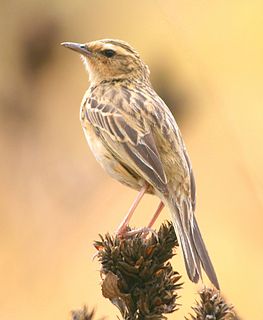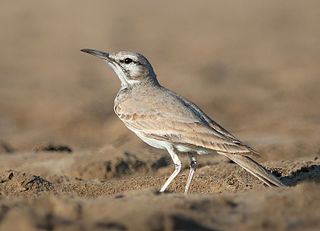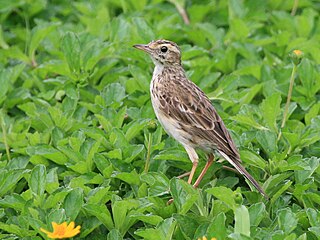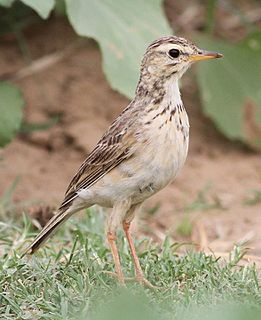
The pipits are a cosmopolitan genus, Anthus, of small passerine birds with medium to long tails. Along with the wagtails and longclaws, the pipits make up the family Motacillidae. The genus is widespread, occurring across most of the world, except the driest deserts, rainforest and the mainland of Antarctica.

The meadow pipit is a small passerine bird, which breeds in much of the Palearctic, from southeastern Greenland and Iceland east to just east of the Ural Mountains in Russia, and south to central France and Romania; an isolated population also occurs in the Caucasus Mountains. It is migratory over most of its range, wintering in southern Europe, North Africa, and south-western Asia, but is resident year-round in western Europe, though even here many birds move to the coast or lowlands in winter.

The greater hoopoe-lark is a passerine bird which is a breeding resident of arid, desert and semi-desert regions from the Cape Verde Islands across much of northern Africa, through the Arabian peninsula, Syria, Afghanistan, Pakistan and India. It was formerly known as the bifasciated lark and sometimes as the large desert lark.

The Madagascar owl, also known as the Madagascan owl or Madagascar long-eared owl, is a medium-sized owl endemic to the island of Madagascar. It is sometimes considered to be conspecific with the long-eared owl.

The Australian pipit is a fairly small passerine bird of open country in Australia and New Guinea. It belongs to the pipit genus Anthus in the family Motacillidae.

The Cape clapper lark is a small passerine bird which breeds in southern Africa. It derives its name from the wing clapping which forms part of the display flight. The Cape clapper lark is a species of open grassland and savannah, also inhabiting karoo, fynbos and fallow agricultural land.

The African pipit is a fairly small passerine bird belonging to the pipit genus Anthus in the family Motacillidae. It is also known as the grassveld pipit or grassland pipit. It was formerly lumped together with the Richard's, Australian, mountain and paddyfield pipits in a single species, Richard's pipit, but is now often treated as a species in its own right.

The bar-tailed lark, or bar-tailed desert lark, is a species of lark in the family Alaudidae. Two other species, the rufous-tailed lark and the Cape clapper lark are both also sometimes referred to using the name bar-tailed lark. It is found from Morocco to Pakistan. Its natural habitat is hot deserts. This is in many places a common species, but elsewhere rather less common. It has a very wide distribution and faces no obvious threats, but surveys have shown that it is slowly decreasing in numbers. The International Union for Conservation of Nature has rated its conservation status as being of "least concern".

Certhilauda is a genus of larks in the family Alaudidae living in the southern regions of Africa. The genus was formerly named Heterocorys.

The Benguela long-billed lark, also known as the Benguela lark or Benguela longbill is a species of lark in the family Alaudidae. It is found in south-western Africa. Its natural habitat is subtropical or tropical dry lowland grassland.

The Cape long-billed lark, also known as the Cape lark, Cape longbill or long-billed lark is a species of lark in the family Alaudidae. It is found in south-western Africa. Its natural habitats are semi-arid Karoo shrub and subtropical dry shrubland and subtropical or dry lowland and highveld grassland. This lark is also found in croplands, farmlands and coastal fynbos.

The eastern long-billed lark, also known as the Kaffrarian long-billed lark or Eastern longbill is a species of lark in the family Alaudidae. It is found in south-eastern Africa. Its natural habitat is subtropical or tropical dry lowland grassland.

The Karoo long-billed lark or Karoo longbill is a species of lark in the family Alaudidae. It is found in southern Africa in its natural habitat of subtropical or tropical dry shrubland.

The black-crowned sparrow-lark is a species of lark in the family Alaudidae. It is found across northern Africa from Mauritania through the Middle East to north-western India. Its natural habitat is dry savanna.

The rufous-naped lark or rufous-naped bush lark is a widespread and conspicuous species of lark in the lightly wooded grasslands, open savannas and farmlands of the Afrotropics. Males attract attention to themselves by a bold and often repeated wing-fluttering display from a prominent perch, which is accompanied by a melodious and far-carrying whistled phrase. This rudimentary display has been proposed as the precursor to the wing-clapping displays of other bush lark species. They have consistently rufous outer wings and a short erectile crest, but the remaining plumage hues and markings are individually and geographically variable. It has a straight lower, and longish, curved upper mandible.

The white-bellied bustard or white-bellied korhaan is an African species of bustard. It is widespread in sub-Saharan Africa in grassland and open woodland habitats.

The blue mockingbird is a species of bird in the family Mimidae. It is endemic to Mexico, but has occurred as a vagrant in the southern United States. Its natural habitats are subtropical or tropical dry forests, subtropical or tropical moist montane forests, and heavily degraded former forest.
Jackson's pipit is a rare and little-known African bird of the pipit and wagtail family.


















